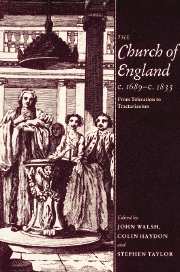Book contents
- Frontmatter
- Contents
- Preface
- List of Abbreviations
- 1 Introduction: The Church and Anglicanism in the ‘long’ eighteenth century
- Part I The pastoral work of the Church
- Part II Crisis and reform
- 5 The Church, the societies and the moral revolution of 1688
- 6 John Locke, Jonas Proast and religious toleration 1688–1692
- 7 The origins and ideals of the SPCK 1699–1716
- 8 Cultural patronage and the Anglican crisis: Bristol c. 1689–1775
- 9 Latitudinarianism at the parting of the ways: a suggestion
- 10 Ecclesiastical policy under Lord North
- 11 The foundation of the Church Missionary Society: the Anglican missionary impulse
- 12 A Hanoverian legacy? Diocesan reform in the Church of England c. 1800–1833
- Part III Identities and perceptions
- Index
6 - John Locke, Jonas Proast and religious toleration 1688–1692
Published online by Cambridge University Press: 13 October 2009
- Frontmatter
- Contents
- Preface
- List of Abbreviations
- 1 Introduction: The Church and Anglicanism in the ‘long’ eighteenth century
- Part I The pastoral work of the Church
- Part II Crisis and reform
- 5 The Church, the societies and the moral revolution of 1688
- 6 John Locke, Jonas Proast and religious toleration 1688–1692
- 7 The origins and ideals of the SPCK 1699–1716
- 8 Cultural patronage and the Anglican crisis: Bristol c. 1689–1775
- 9 Latitudinarianism at the parting of the ways: a suggestion
- 10 Ecclesiastical policy under Lord North
- 11 The foundation of the Church Missionary Society: the Anglican missionary impulse
- 12 A Hanoverian legacy? Diocesan reform in the Church of England c. 1800–1833
- Part III Identities and perceptions
- Index
Summary
After the publication in autumn 1689 of A Letter Concerning Toleration, John Locke allowed himself, for the first time in his career, to become embroiled in a public polemical exchange with one of his critics. His tract was attacked by two High Church clergymen who upheld the coercive uniformity exacted by the Restoration Church. Locke ignored the more senior of them, Thomas Long, archdeacon of Exeter, but responded with the utmost seriousness to an elegant and forceful pamphlet by an Oxford divine called Jonas Proast. Locke's Second (1690) Third (1692) and unfinished Fourth (1704) Letters on Toleration were all critiques of Proast, and they fill nearly six hundred pages in his Works.
Locke had written the First Letter, or rather its Latin original, the Epistola de tolerantia, in Holland in 1685, under the shadow of Louis XIV's Revocation of the Edict of Nantes. It is an olympian essay which has acquired a pre-eminence in the canon of his work. The subsequent Letters have a more precise contextual location in English church politics, and more can be said about their circumstances than has hitherto been recognized. Jonas Proast was not an isolated target. In assaulting him, Locke placed himself firmly amid the developing quarrel between High and Low Church factions within the established Church. He publicly associated himself with the Latitudinarian wing, and more particularly with the circle of John Tillotson, archbishop of Canterbury from 1691 to 1694.
- Type
- Chapter
- Information
- The Church of England c.1689–c.1833From Toleration to Tractarianism, pp. 143 - 171Publisher: Cambridge University PressPrint publication year: 1993
- 9
- Cited by



